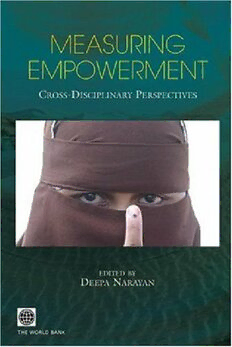
Measuring Empowerment: Cross-Disciplinary Perspectives (Trade and Development) PDF
500 Pages·2005·3.35 MB·English
Most books are stored in the elastic cloud where traffic is expensive. For this reason, we have a limit on daily download.
Preview Measuring Empowerment: Cross-Disciplinary Perspectives (Trade and Development)
Description:
Poverty reduction on a large scale depends on empowering those who are most motivated to move out of poverty?—poor people themselves. But if empowerment cannot be measured, it will not be taken seriously in development policy making and programming. Building on the award-winning 'Empowerment and Poverty Reduction' sourcebook, this volume outlines a conceptual framework that can be used to monitor and evaluate programs centered on empowerment approaches. It presents the perspectives of 27 distinguished researchers and practitioners in economics, political science, sociology, psychology, anthropology, and demography, all of whom are grappling in different ways with the challenge of measuring empowerment. The authors draw from their research and experiences at different levels, from households to communities to nations, in various regions of the world. 'Measuring Empowerment' is an invaluable resource for planners, practitioners, evaluators, and students—indeed for all who are interested in approaches to poverty reduction that address issues of inequitable power relations. Note on cover: The picture of the woman in burqa is from the front page of a leading newspaper in India, the day after elections in the state of Mahashtra. The woman holds up her finger, marked by indelible ink to show that she has just voted and exercised her right and freedom to choose the leaders of her state of almost 100 million people.
See more
The list of books you might like
Most books are stored in the elastic cloud where traffic is expensive. For this reason, we have a limit on daily download.
